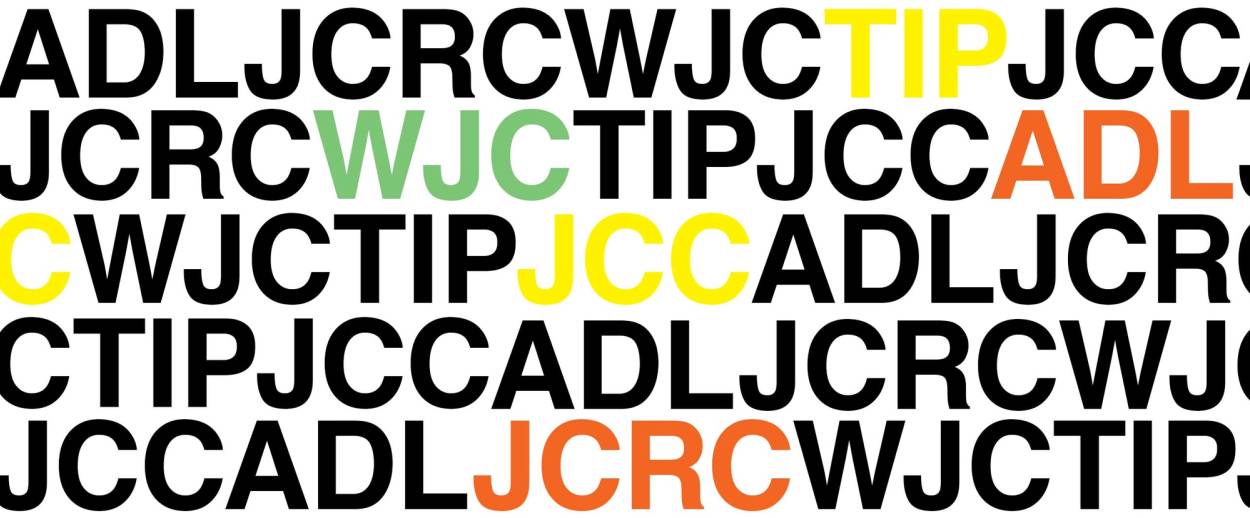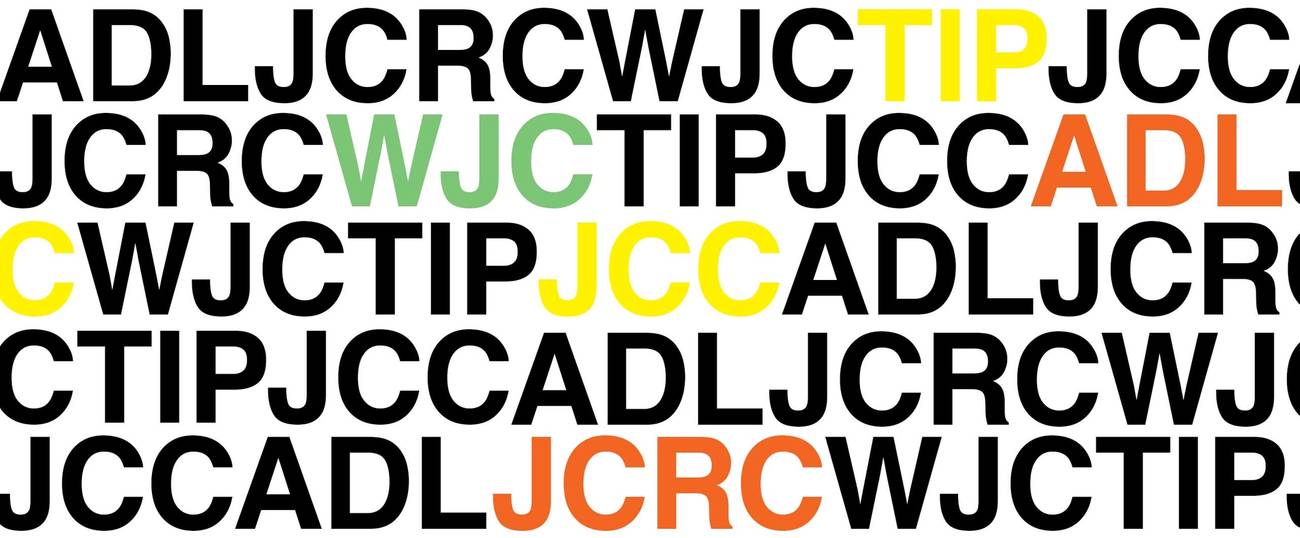At the Top of Jewish Organizational Life, a Collective Changing of the Guards
What the appointments of young, new executives mean for some of our oldest communal groups




On Monday, the Conference of Presidents of Major American Jewish Organizations (COP) announced that William Daroff has been tapped to succeed Malcolm Hoenlein, the group’s longtime executive vice chairman.
Founded in 1956 as an umbrella voice—President Dwight Eisenhower pressed for a one-stop shop to interact with the Jewish population—COP, according to its website, “advances the interests of the American Jewish community, sustains broad-based support for Israel and addresses the critical concerns facing world Jewry.” It counts 50 member organizations on its posted roster.
Daroff’s appointment as CEO signals a sea change, not only for COP but for the entire alphabet soup of Jewish communal institutions. (Full disclosure: I’ve worked with every one of the professionals mentioned in this article, and consider some of them among my closest friends.) Hoenlein, who turned 75 in February, assumed the reins back in 1986. A product of the movement to secure human rights for Soviet Jewry, he’s been a legendary champion of Jewish and Israeli interests. Daroff, at 50, is a full generation younger. A former Republican operative and now professed “post-partisan,” he comes to COP after close to 14 years as senior vice president of the Jewish Federations of North America (JFNA) and director of its Washington office.
Both are consummate doyens of the Jewish establishment, but Daroff’s profile is fitted uniquely to the current zeitgeist. He’s a prolific consumer of social media and an all-star of Jewish Twitter. He’s also vegan. Hoenlein will graduate to vice chairman of COP, but new winds are sure to blow. In their statements celebrating the changeover, Hoenlein expressed his desire to work at “building on the COP motto, ‘Strength Through Unity,’” while Daroff said, pointedly, that he was “awed by the broad strength and diversity of Jewish Americans.” The new hire is an advocate of “big tent” inclusion.
The shuffle opens up a coveted slot at JFNA, where Eric Fingerhut, the former president and CEO of Hillel International, stepped into the shoes of departing president and CEO Jerry Silverman just this week. JFNA, which represents 147 Jewish Federations and over 300 auxiliary communities across North America, is charged to “raise and distribute more than $3 billion annually,” and is active in “the fields of caregiving, aging, philanthropy, disability, foreign policy, homeland security and health care.”
Both men are in their early 60s, but Fingerhut, a former congressman from Ohio, comes to JFNA fresh off a six-year run at the helm of the world’s largest Jewish campus association. Having had to service the needs of Jewish students on more than 550 colleges and universities–and navigate more than a fair share of controversy–he brings that mindset and toolkit to the Federation system as it toils precisely to spur a younger generation of Jews toward communal activism. Hillel will presumably search for a similarly endowed figure to direct its operations moving forward.
These newest developments come over four years after Jonathan Greenblatt was hired to take over from Abraham Foxman at the Anti-Defamation League, where Foxman had been for half a century. Committed to “stop the defamation of the Jewish people, and to secure justice and fair treatment to all,” ADL turned to Greenblatt—only 44 at the time, and over 30 years Foxman’s junior—to expand its appeal beyond traditional boundaries. A social entrepreneur and principal at the Obama administration’s Office of Social Innovation and Civic Participation, he reoriented the ADL’s approach in ways that, while not to everyone’s taste, have made the organization a prominent player in the public discourse.
Other prominent agencies are in play as well. Robert Singer resigned last month as CEO and executive vice president of the World Jewish Congress. Together with the exit of other senior staff, this latest shake-up at the outfit that advocates on behalf of Jews “in 100 countries around the world,” provides another opportunity to craft a reconfigured agenda and leadership that might yet attract a wider fan base.
Also last month, Josh Block left his position as CEO and president of the Israel Project and the 17-year-old shop “dedicated to informing the media and public conversation about Israel and the Middle East” shuttered its doors. Lior Weintraub, Block’s vice president, drafted a postmortem on Facebook. TIP, he wrote, had adhered to “our apolitical bipartisan middle-line with all our might… but [t]here were no buyers for anything in the middle ground in 2019 and TIP as an organization in the middle of medium size became the first victim of the polarization of the pro-Israel system in America.” The void clamors now for a revamped heir.
Once upon a time, I was convinced that storied nonprofits—like their old school gala dinners—were unsalvageable relics. But a new crop of chief executives is poised now to prove me wrong. And while that may seem trivial to some, it’s actually a big deal. The work that groups like COP do is not always visible to members of the Jewish community, but there can be little doubt that it’s a large part of the reason why American Jews have been punching well above their numerical weight. From engaging with other faith-based communities to interceding with law enforcement to providing educational resources that give disadvantaged individuals a shot at a better future, our communal organizations are adept at marshaling their collective clout and acting as the vital guarantor of communal welfare. It would be a mistake to consign them to history’s trash heap.
The recipe for success in the future, however, must include a few key ingredients. At the risk of being cliché, I’ll offer my interrelated ABCs as a foundation:
Accessibility: Constituent bodies can’t operate in a vacuum. If they’re not approachable and accountable, they’ll lose traction swiftly. The incoming crew appreciate this fact and will, hopefully, maintain eye contact with the community they aspire to lead.
Bipartisanship: Political power in democratic societies changes hands by definition. Service organizations that maintain productive relationships with all sides of the debate will deliver essential value, measured best in inevitable times of crisis.
Civility: Today’s public square is emotional and ugly. Ensuring that stakeholders feel welcome in the discussion will enhance the cachet of the entire Jewish establishment.
The search for elusive consensus within the broad Jewish community has often met with frustration and disappointment. And with the stakes being higher than ever in recent memory, a dwindling Jewish footprint could produce devastating consequences. The new stewards of venerated Jewish institutions will need to summon every ounce of personal experience and wisdom as they come to the plate.
***
Like this article? Sign up for our Daily Digest to get Tablet magazine’s new content in your inbox each morning.
Shalom Lipner (@ShalomLipner) is a nonresident senior fellow for Middle East programs at the Atlantic Council. From 1990 to 2016, he served seven consecutive premiers at the Prime Minister’s Office in Jerusalem.